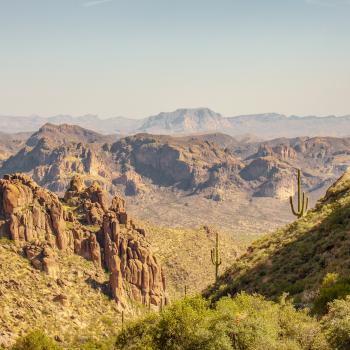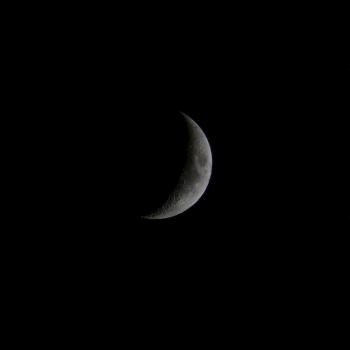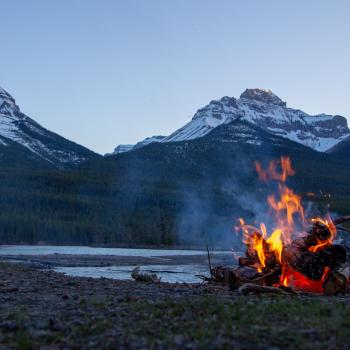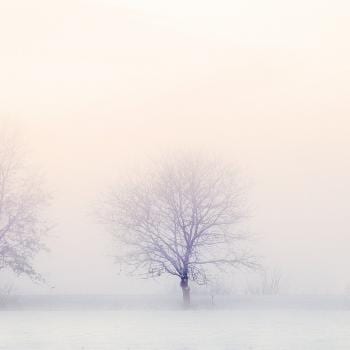The apotheosis of the Dierne is a few days away, and I want to cover the three basic parts of the celebration that laity or those interested in the Otherfaith should focus on when July 31st rolls around. As with the basics of the entire Otherfaith, we’ll be focusing on contemplation – the symbols and meanings surrounding the holy day – daily action – how to approach the day and what to avoid in terms of concrete actions – and prayer. This first post will focus on contemplation, the next of action, and the last on prayer.
Basic: as I mentioned in my previous post, the Dierne becomes a god through bloodshed and empowerment. I would say this holy day is ultimately about the cost of change.
Communal Power
In the most basic breakdown of the myths surrounding the apotheosis, the Dierne overthrows Mircea, who has used his position of power to harm others. The problem with leaving that statement without amendment is that the Dierne doesn’t enact change all on his own. He’s not a savior figure, even if he is a god. Other hands are always involved in the act.
the Dierne is a really egotistical deity. He loves himself, and he is aware of his beauty and allure. He’s the god I get the most questions about on tumblr and the most requests for on the shrine. He’s concerned with love, which makes him very popular, and he seems to be the reality of a lot of Western ideals. But he becomes a god through the acceptance of the people around him, and his power is founded in the power of others. He isn’t the one man revolution than Western culture loves to fawn over. As with much of the Dierne, that’s how he appears. That’s not what he is.
None of us is alone. That’s not just a pretty sentiment. We are literally surrounded by thousands of creatures and people, and without them we wouldn’t survive. As attractive as the idea of the ‘lone wolf’ is, it isn’t something we focus on or elevate in the Otherfaith. Even when the Dierne is exiled and has to fight to go back home, he doesn’t do it alone. He has friends. He has companions.*
Nobody dies alone.
I think this is an important aspect to stress and begin with because of how Western culture interacts with empowerment and revolution. A really good example of this is zombies. I used to hate zombies because they scared me – I used to hate all horror, which has since changed. Now, I dislike the zombie metaphor, what is says about our culture in a wider way.** (Plenty of you know where this is going, don’t you?) A lot, lot, lot of people have pointed out how zombies are usually a metaphor for the ‘mindless masses’, ‘the sheep’, and ‘the mob’. As a conversation about mob mentality, they’re definitely interesting – we eat each other! We eat people that aren’t like ourselves! But I cannot deny a fundamental discomfort for me with the idea of zombies as metaphors for our fellow humans as mindless masses that we get to slaughter because we’re special.
I’m probably bothered because I totally know I would become a zombie in a zombie apocalypse. Like, no question, I would not stand a chance. Dead or a zombie. I would not be one of the special people that ‘makes it’.
I have similar problems with superheroes – the special few among the masses.
So an important thing to contemplate surrounding this holy day is the meeting of the individual and the communal, how we do not succeed completely alone. There are always people behind us, shoulders we are standing on, people that hurt and helped us. The Four Gods can’t ‘right the world’ when it’s just one of them acting – it has to be all of them and their people. And I think it’s telling that the main antagonist and problematic figure in the myths is one that continually places his wellbeing above the dignity of others, and that he is consistently overthrown because the people say no.
Isn’t it telling that in our wider society we idealize the one man revolutionary but most of us scoff at chants like ‘the people united will never be defeated’?
This holy day is about the strengths of everyone, each voice and hand, working to create change – from oppression to freedom, and from spirit to god. (the Dierne is deified through the will of the people who support him.)
Oppression & Abuse
Tying into the aspect that we just covered, the apotheosis of the Dierne and its mythos tells us about where the Other People believe unethical behavior comes from.
It is very easy to see Mircea – an antagonist in the myths – as the ‘agent of evil’. That’s wrong. Completely and totally wrong. He doesn’t always make the wrong choices, and he doesn’t force or compel us to make choices that hurt others. He can’t come down and prod you into going against your ethics. What he illustrates as a mythic figure is that our capacity for horrific acts is human. We each have that capacity. The Other People do not externalize our poor behavior or acts.
When I say that each of us is capable of horrific acts, I’m not trying to ‘scare’ you into behaving properly. But a huge part of contemplation in the Otherfaith is looking at ourselves honestly and seeing those frightening beasts within us, seeing what we could be, how we are capable of hurting others and bringing great destruction around us, and recognizing that we have a choice. And we need to decide what type of person we will be.
Not for some cosmic war, but because we know what happens when we don’t take a stand. We’ve seen what happens when we’re silent and complicit.
This is the other side of the communal power discussed above. When we get together in groups, we start behaving strangely, to say the least. This holy day balances that space between the people’s revolution and that one voice that stands up to oppression, so we need to contemplate all sides of community and behavior.
We’re capable of greatness. We’re capable of horror.
This holy day is idealistic. We celebrate that we can destroy oppression, we can break our chains, we can strike back and even get revenge. This is about empowerment and hope. We have to hope that we can change and that we can create change. Even in the most horrific times, we have to have hope that the world will change.
And then we need to make space for that change to happen – everyone does. Because it may take one voice to point out the problem, but we all have a part of play in fixing that problem.
Abuse and oppression are tied into each other, and I feel it is necessary to note that abuse and oppression are never the fault of the abused or oppressed. So when I say that we are ‘complicit’ in such, I am not talking about the abused or oppressed but those who are in a position to stop that abuse, those that are in positions of power and privilege.
Hope
I mentioned above that we have to have hope that the world can change. One of the best ways to disempower people is to convince them that there is nothing they can do, that nothing will get better, that we’re stuck.
So we should take a while to contemplate hope, how we relate to hope, what we think of it, its role in our lives, and how to keep hope alive. the Dierne is associated in some ways with the dawn, with newness, with possibility. He’s hope. His house and holy line of partners and children is called ‘House Hope’.
He’s that cheesy line – “Everything will be okay in the end. If it’s not okay, it’s not the end.” the Dierne himself will at times simply curl into a ball and say, again and again, “This is not the end.”
This holy day is, as I said, one of the most important in the Otherfaith. The other, Reunion, is all about joy, and peace, and the world that has been righted. The apotheosis of the Dierne is about the world that has just come out of turmoil, the world still reeling from calamity, all of us who feel our world breaking.
This is not the end. We will go on. We will be strong, and we will be stronger.
Though some of the concepts in the Otherfaith sound very frilly – love and hope – we’re encouraged to contemplate what those concepts really are and what they really mean in our lives.
What is hope? the Dierne asks us. And what will we do to keep hope alive?
~
I hope everyone is having a great week. I’m headed out to Seattle today, and my excitement and nerves are through the roof. Let’s hope it’s a good vacation.
*We definitely do have room for people that don’t like interacting with others or are introverted or asocial – a whole group of spirits in the Otherfaith are asocial or live on the fringes of their communities. We don’t idealize that, nor do we idealize the communal! In many stories of the spirits of the West, community problems (group mind, hostility to outsiders, etc.) is highlighted and explored. But, as I’ve mentioned before, the Otherfaith is a communal religion, so…community has a vital role.
**Important note: I haven’t studied zombies and their metaphoric meaning and how they reflect on our culture extensively. Mostly, I’m commenting on my thoughts as a viewer and consumer of zombie-saturated media. Please don’t read this to me that my word is law about zombies or their meaning because it isn’t, and I’m not trying to say that. And I’m not saying people who enjoy zombie media are ‘bad’ either, in case you’re thinking that. Nor am I saying that every zombie story follows exactly the same theme, but those are very prevalent ones.
















